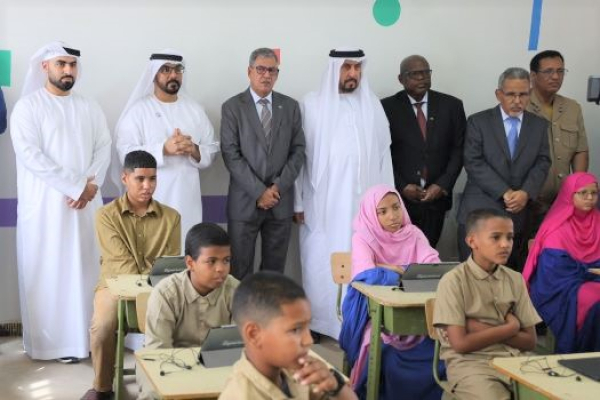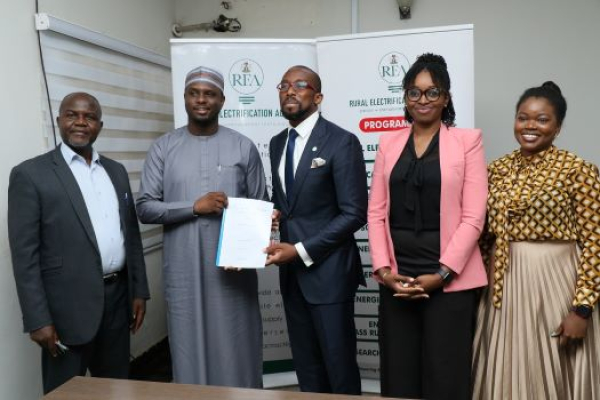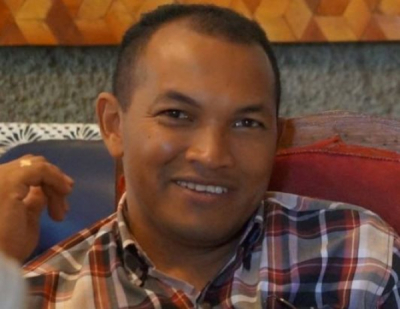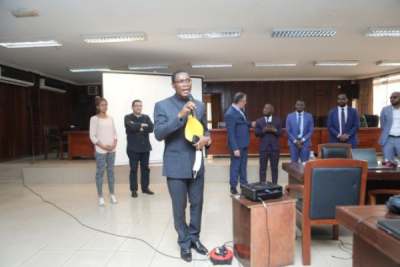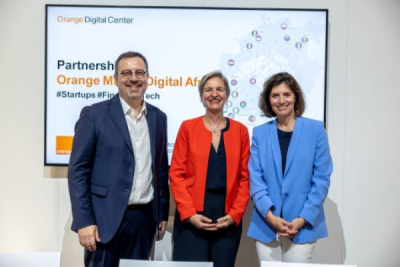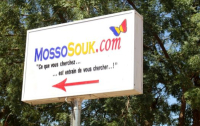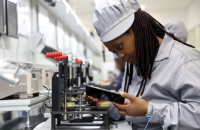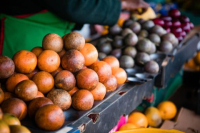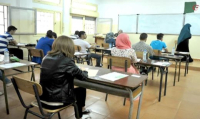Launched in 2020 to train young people in several countries, the "Digital School" initiative seeks to ensure continuous innovation and promote digital learning through gamified modules and AI-driven adaptive learning.
Digital School, one of the global initiatives launched by UAE Prime Minister Sheikh Mohammed bin Rashid Al Maktoum, recently inaugurated 66 new digital learning centers in Mauritania, the Emirates News Agency (WAM) reported.
The new centers, created in collaboration with the Emirates Red Crescent (ERC), aim to spread digital skills and edtech solutions across the Arab region.
"Our partnership with the Mohammed bin Rashid Al Maktoum Global Initiatives in The Digital School project in Mauritania and other countries aims to facilitate students' access to advanced digital educational content, encourage learning and knowledge acquisition, overcome challenges, combat school dropout rates, enrich electronic content, and support education that promotes development, stability, progress, and prosperity in communities," said Hamoud Al Junaibi, ERC Deputy Secretary General.
The digital learning centers were inaugurated as part of the second phase of a project born from an agreement signed, in 2021, by the Islamic Republic of Mauritania and the Digital School initiative to establish digital schools in Mauritania.
In its pilot phase, six digital centers were opened in four middle and two elementary schools to benefit 635 pupils. Twelve teachers and three team members were trained in the digital education sector. After the training, certificates were handed out by the University of Arizona and 400 electronic tablets were distributed as well.
The second phase of the project aims to extend this experience to 60 new schools, benefiting 20,000 pupils in primary and preparatory schools. It also includes the training of 146 teachers and an increase in the number of project team members. The ultimate goal is to reach 100,000 pupils and 1,000 teachers over the next three years.
Samira Njoya
To create the right professional framework for workplace fulfillment, a Moroccan startup has developed a solution using artificial intelligence, augmented reality, and neuroscience.
Veezen is a digital solution developed by a Moroccan start-up. It enables companies to monitor the mental and psycho-emotional health of their employees, to positively impact their productivity.
Among other things, it aims to support entrepreneurs in the employee recruitment process and create the right working environment for optimal productivity.
“Healthy Employees are better able to focus on their work, leading to greater productivity and efficiency. [...] Healthy employees have greater energy levels, which can increase productivity as well as overall job satisfaction. [...] Healthy employees are less likely to get sick and need time off work, which can improve overall workplace productivity,” the solution indicates on its web platform.
Through its Android app, users can register by responding to prompts from the embedded virtual assistant. The virtual assistant guides users through the entire process, right up to the eventual appointment and the check-up by an expert. Appointments and check-ups are pretty uncommon as companies initially opt for group follow-ups.
Veezen contributes to the personal development of company staff through conferences and workshops on well-being. It also conducts employee surveys to identify any emotional or affective problems that may be negatively affecting personal and professional life.
Veezen was incubated at Stargate, a Moroccan incubator based on the campus of Mohammed VI Polytechnic University. In 2023, the start-up was one of the hundred Moroccan start-ups that took part in Gitex Africa, a technology trade show held in Marrakech from May 31 to June 2, 2023.
Adoni Conrad Quenum
The software engineer develops fintech solutions for various purposes in the growing fintech industry in Africa.
Andry Randriamanamihaja (photo) is a Malagasy entrepreneur and computer engineer. He graduated from Polytechnic ISPM (Madagascar) in 1998, with a master's in business computing, software engineering, and artificial intelligence. He is also a certified digital finance practitioner.
In 2018, he officially launched the fintech company Vanilla Pay to dynamize the financial sector in his home country. The first tech solution he developed through Vanilla Pay is a mobile payment aggregator that enables business professionals to make online sales securely, conveniently, and automatically. The aggregator integrates all of Madagascar's mobile operators and is now used by universities, training centers, and e-businessmen. The aggregator claims nearly 50,000 active users with a peak of 3,000 financial transactions processed every minute.
Apart from the payment aggregator, the fintech company plans to launch an international payment solution geared toward tourists. The solution, called Vanilla Pay International, will be presented for the first time during the International Tourism Fair Madagascar that started yesterday, June 15. It is an e-wallet that enables tourists to directly send funds to residents’ mobile money accounts once in Madagascar.
Andry Randriamanamihaja, who was incubated by Orange Fab in 2019, tells We Are Tech Africa that he wants to turn Vanilla Pay into a unicorn valued at millions of euros within five years. The VivaTech 2022 participant already has some ideas to make that ambition a reality. He for instance plans to develop a blockchain-based system for real-time money exchange between islands in the Indian Ocean.
Before Vanilla Pay, Andry Randriamanamihaja founded Ariary.net in 2015, a start-up that aimed to revolutionize the financial landscape in Madagascar and democratize online payment.
His professional career began in 1998 with the IT company Advanced Information Systems, where he was an offshore project manager. From 2003 to 2009, he worked on a World Bank project to set up a Public Expenditure Management Information System.
Melchior Koba
When he moved to New York for his studies, Hanin Hadjeb, a young Algerian discovered a new restaurant business model, which he decided to reproduce back at home. Fast Delivery was then born.
Fast Delivery is a digital solution developed by an Algerian start-up. It enables users to order food, shop in supermarkets, and have the orders delivered to homes or offices.
From the Android or iOS apps, users can set up their accounts to access the various services. For orders to get delivered, users need to first input their address or let the mobile app detect it using the GPS feature. Then, they can add products to their baskets and validate the orders.
They can pay via bank card or in cash at delivery. The solution promises delivery within fifty minutes, depending on the weather and traffic conditions. In any case, the clients can monitor the process in real-time through the app.
According to Play Store statistics, the Android version of the application has been downloaded over a hundred thousand times. Fast Delivery only operates in Algiers and Blida and hopes to expand to other major cities in the country.
Adoni Conrad Quenum
In recent years, Cameroon has witnessed the multiplication of entrepreneurship support institutions. One of the main ones is the CDIC, launched by the government to promote tech innovation.
The Cameroon Digital Innovation Centre (CDIC) is a national incubator and center of excellence for digital research, development, and innovation. Launched on February 8, 2022, by the Ministry of Posts and Telecommunications, it supports start-ups offering digital solutions in key sectors in Cameroon.
CDIC's role is to incubate and mentor digital project leaders, facilitate relations between start-ups and public administrations, assist start-ups in launching their activities, and stimulate job creation for graduates. It also supports start-ups in their search financing and strengthens technology watch and international cooperation in the digital field.
The center has a co-working space to encourage collaboration between start-ups. It organizes events, consulting sessions, mentoring programs, and other workshops run by leading digital companies, exclusively for tech start-ups. It also has connected classrooms ideal for all types of online training. The classrooms feature a digital screen, enabling more interactive and immersive training.
Thanks to its multimedia space, which includes a recording room and a spacious control room, the center provides entrepreneurs with the right technical conditions and an atmosphere conducive to strategic thinking and the development of audio and video content.
With its highly connected and secure data center, it guarantees digital sovereignty and data protection. It has a digital manufacturing laboratory equipped with several high-end 3D printers adapted to the needs of start-ups and for prototyping problems. It offers cloud computing solutions including several innovative services such as virtualization.
By creating that infrastructure, the Cameroonian government wants to build a genuine local digital industry able to create thousands of direct and indirect jobs, professionalize skills in the digital field, and accelerate the country's digital transformation.
Melchior Koba
In the digital age, tech entrepreneurs have a growing potential to create wealth and jobs in Africa. However, they face several challenges that require urgent measures to encourage local talent and promote access to financing.
Last Wednesday, telecom operator Orange Africa and Middle East (OMEA) and pan-African digital initiative Digital Africa signed a strategic partnership agreement to foster the growth of African startups. The agreement was signed by Jérôme Hénique, CEO of Orange Africa and Middle East (OMEA), and Isadora Bigourdan, CEO of Digital Africa, on the sidelines of the 2023 edition of tech conference VivaTech, ongoing in Paris, France.
Under the agreement, the two entities will identify and select promising technology start-ups across the African continent. Those selected will be able to access a range of resources, including mentoring programs, technical assistance, funding mobilization, and networking opportunities through the Orange Digital Center and the Digital Africa community.
According to Isadora Bigourdan, digital talent is the key to transforming the African continent. "...This partnership with the Orange Digital Centers is fully in line with our deployment strategy, which aims to identify promising entrepreneurs at the onset, and facilitate their access to support, financing, and advocacy tools through an international network of allies," she said.
"...This collaboration with Digital Africa [...] adds an essential component to our current network of Orange Digital Centers, by simplifying access to flexible financing solutions, specially designed to meet the needs of entrepreneurs in their seed phase. This collaboration represents real added value and will help stimulate the growth of the African startup ecosystem," added Jérôme Hénique.
Orange Digital Center (ODC) is an ecosystem deployed in 17 Middle East and African countries and 8 European countries. It supports, trains, and mentors young people and the bearers of innovative ideas, to enhance their employability and prepare them for the jobs of the future (AI, cybersecurity, ...) or to encourage them to become digital entrepreneurs. Each ODC hosts a range of free programs open to all, from digital training for young people to start-up acceleration, as well as support and investment in project leaders.
The cooperation with Digital Africa is in line with some of the recommendations made, in 2022, by the Tony Blair Institute for Global Change to enable African start-ups to raise more than $90 billion by 2030 and make Africa a superpower in the technology sector.
The recommendations included developing innovative financing vehicles, unlocking capital from institutional investors and corporates, building the capacity of start-ups and support organizations, and launching a "pan-African start-up network".
Muriel Edjo
The solution was launched in 2015, years before the coronavirus pandemic that gave a new impetus to the African e-commerce industry. It aimed to give a customized and revolutionary platform to residents in its native country, Chad.
Mossosouk is an online marketplace developed by a Chadian startup. It enables users to purchase various products. It also enables merchants to set up their virtual stores to reach more buyers.
"Many merchants didn't understand the [power of Internet]. We had to educate them to let them know that selling online was all to their benefit," says Andreas Koumato, founder and CEO of the startup behind Mossosouk.
The solution offers a mobile app, accessible on Android and iOS devices. Once they set up their accounts, users can access a wide range of products, including electronics, beauty, sports, and IT products, as well as special offers and promotions. Mossosouk also offers an option for tracking orders, from purchase to delivery. Delivery is handled by another department of the platform.
Merchants can also open virtual stores on the platform. To do that, they need to visit the platform, click the “Become a seller” button and follow the prompts. The e-commerce platform will require certain information and documents to validate sellers’ accounts.
For the time being, Mossosouk claims over 250 sellers. The Android version of its mobile application has already been downloaded more than 500 times. The company has not yet raised any funds but it plans to expand outside Chad and eventually become a reference in the African e-commerce industry.
Adoni Conrad Quenum
In Africa, millions of residents still live with no access to high-speed Internet. The situation, which is the result of several factors, including poor telecom coverage and the cost of suitable phones, threatens digital inclusion, which is supposed to drive development.
On Tuesday, June 13, Angola's LiraLink Tecnologia and China's ZTE signed a partnership agreement to set up a cell phone assembly plant in Angola. The assembly plant, due to be operational in 2024, will focus on the manufacturing of 4G and 5G handsets.
The documents officializing this agreement were signed by LiraLink Managing Director Walter João and ZTE Group Vice President Ni-Fei, under the supervision of Angolan ICT Minister Mário Oliveira, on the sidelines of Angola's International ICT Forum (ANGOTIC), held from June 12 to 14.
The project was initiated to bring quality and affordable phones to the Angolan market. In its 2020 report "From luxury to lifeline: Reducing the cost of mobile devices to reach universal internet access", the Alliance for Affordable Internet (A4AI) found that the cost of smartphones is still quite high.
In the 187 countries surveyed, the average cost of a smartphone represents around 26% of an average monthly per capita income, or $104 according to A4AI. In some countries and regions, the cost is even higher.
In South Asia and sub-Saharan Africa, for example, the average cost of a smartphone exceeds 40% of the average monthly per capita income. "Even worse, in the Least Developed Countries, the average person would have to spend over half of their monthly income to buy a smartphone. Those in low-income countries have to spend almost 70% of their average monthly income to purchase the cheapest available smartphone on the market."
According to Lúcia Yang, ZTE's commercial zone manager, the smartphone assembly plant to be set up will also have a support center to meet customers' needs.
Muriel Edjo
Owing to the number of middlemen in the agricultural value chain, food prices usually skyrocket from farms to markets. Despite that fact, farmers are usually unable to make decent living income from their products while consumers have to pay high prices for those same products. Jangolo wants to change that.
Jangolo is an e-commerce platform developed by a Cameroonian start-up. It gives consumers direct access to fresh produce via its web and mobile platforms. The Douala-based start-up behind the platform was founded in 2016 by Bertrand Foffe, Rodrigue Kwanga, and Paulin Nguekam. The aim is, among other things, to reduce local producers' post-harvest losses and boost consumers' purchasing power.
"We realized that by the time products go from farms to markets in Douala, their prices usually rise three folds on average. At least six middlemen intervene in the process, putting much pressure on the farmer who sells at a loss,” said Bertrand Foffe while expanding on the reasons that prompted the launch of Jangolo.
So, with two friends, Bertrand Foffe embarked on the Jangolo adventure. The start-up has developed an Android app, Jangolo Farm, which simplifies the buying process by allowing users to add products to their basket even when they are offline and validate the order when online. Users can also order via the web platform. Before anything, a user needs to be logged in or register an account. Once the orders are validated, the start-up's delivery service takes care of the delivery.
"Our services are focused on improving the living and working conditions of local farmers. We support farmers in their day-to-day operations. This means they can focus on their core business, and no longer worry about marketing” aspects, adds Bertrand Foffe.
Currently, the startup is only available in Douala. It says it is currently unable to serve other cities because some areas are hard to reach. In the areas covered, delivery costs CFAF500 (around $0.82). Buyers also have the choice to go to one of the startup’s sales outlets to simply pick their orders.
Jangolo boasts over 70,000 users, more than 5,000 products on its platform, and over 600 shops. Its application has already been downloaded more than a thousand times, according to Play Store data.
Adoni Conrad Quenum
Internet is nowadays considered an essential tool for most of our daily activities. The service, which demonstrated its importance during the Covid-19 crisis, is also considered a threat depending on the context in which it is used.
Fixed and mobile Internet connections were severely disrupted throughout Algeria on Sunday, June 11, because of the 2023 baccalaureate exam. Social networks, instant messaging, and certain websites were blocked to prevent fraud during the exam.
The disruptions are set to continue till the end of the exam, on June 15. It is a government decision that follows previous years’ pattern when the government cut internet access on exam days and exam sessions.
Internet disruptions affect more than 49.45 million fixed and mobile subscribers (according to the latest figures from the telecom regulator ARPCE). This represents 91.31% of all internet users in the country where the service is essential for cabs, delivery drivers, restaurants, online clothing stores, etc.
In Algeria, the baccalaureate exam period is always a frustrating time, with Internet access restrictions and the resulting disruption to business activities. This is because the government has taken the radical decision to limit access after several unsuccessful attempts to prevent exam malpractices. Years earlier, the government had tried less radical measures such as electronic jammers installed in examination centers to prevent candidates from accessing the Internet.
In the diaspora, some wonder whether an outright cut is the best way to go. For them, a thorough search of candidates to detect wireless communication devices before allowing them in exam rooms and sector jammers might be more than enough.
Samira Njoya
More...
The solution was co-founded by a trained nutritionist and dietician who decided to help those suffering from food-related illnesses and malnutrition.
Lya Dietitian is a digital solution developed by Ugandan start-up Impact Nutrition Limited. It offers clinical nutrition services and enables users to adopt the right eating habits to maintain good health.
Its founding startup, Impact Nutrition Limited, was launched in 2017 by Nankunda Ronnah and Regina Nantege.
Impact Nutrition Company Limited’s mission is to “reduce the growing health burden of diet-related non-communicable diseases, obesity, and the persisting levels of undernutrition in Africa. Each person with a diet-related disease or malnutrition deserves access to appropriate diet therapy for a healthy life,” the startup explains on its web platform.
To successfully carry out this mission, in 2022, the startup launched its Android and iOS apps. Once they set up their accounts, users are required to enter some information about their health and the goals they wish to achieve through Lya Dietitian (weight loss, blood pressure control, etc.). Based on this information, the start-up's nutrition and dietetics experts suggest adequate solutions.
Users then begin to receive daily customized meals, with Lya Dietitian tracking the subscribers’ progress over time. It should be noted that the solution also provides nutritional advice and healthy products that can help achieve various health goals.
According to Play Store data, the Android version of the app has been downloaded over a hundred times.
Adoni Conrad Quenum
Silikin Village is an innovation hub dedicated to catalyzing growth in the Democratic Republic of Congo (DR Congo). Its primary goal is to establish a digital entrepreneurship ecosystem that provides support to both local and international partners and entrepreneurs.
Silikin Village is an entrepreneurship and innovation hub established in the heart of Kinshasa in the Democratic Republic of Congo. It is a platform dedicated to learning, entrepreneurship, and innovation, bringing together learners, project leaders, entrepreneurs, small and medium-sized enterprises, large corporations, and private and public partners interested in employability solutions.
As a catalyst for start-ups and businesses, it focuses on identifying talent and developing innovative products and services. It is led by Raymond Mendy who boasts decades of executive experience in the telecom, marketing, and even entrepreneurship industries.
Founded in 2020 by Texaf, a local company operating in the real estate, mining, and digital sectors, Silikin Village wants to become one of Africa’s largest entrepreneurial hubs. It provides entrepreneurs with modern office, training, meeting, and event spaces. The fully-equipped collaborative workspaces offer the opportunity to network with employees from other companies, including entrepreneurs, freelancers, and teleworkers.
The innovation hub offers short-term training courses focusing on technical and managerial skills. Its training programs include No-Code, developed in collaboration with Le Plan B, a no-code training platform. The program enables learners to create single and multi-page websites, generating interaction with their target audiences.
Apart from its training programs, Silikin Village also implements support programs to help entrepreneurs take their startups from the ideation to the acceleration phase. It allows them access to project structuring, strategic support, and its business network, in short to everything they need to develop their projects.
The innovation center collaborates with a multitude of institutions and agencies supporting innovation in Africa. These include Trace Congo, Kinshasa Digital Academy, Kinshasa Digital, Africa Green Power, Upsail Africa, and Ingenious City.
Melchior Koba
Unlike most of the fintech solutions sprouting across Africa, the solution chose to add Sharia-compliant products and services.
HalalVest is a fintech solution developed by a Nigerian start-up. It facilitates access to financial services such as savings, loans, investments, insurance, pensions, and payments.
As a Halal-friendly solution, the fintech works with financial institutions to help them list their Sharia-compliant products. It facilitates electronic payments and the collection of Islamic alms like zakat, sadaqah, and waqf. It aims to democratize access to interest-free financial products and services.
“We are focused on building and sustaining long-term access to ethical financial products and services. [We aim] to be a leading Non-Interest Fintech Bank in Africa and Middle East region,” the solution indicates on its web platform.
Users can sign up for HalalVest's services through their Android app by completing a specialized form. After verification, they gain access to a variety of ethical savings and investment plans from multiple providers. HalalVest serves as a convenient platform for accessing traditional financial services and more. Through their web platform and mobile app, users can conveniently transfer funds to any bank globally.
The fintech claims a thousand members and serves around 5 countries in Africa and the Middle East. According to Play Store, its mobile application has already been downloaded over 100 times.
Adoni Conrad Quenum
The decision is an important step to ensure education while waiting for things to get back to normal after the pro-Sonko protests.
Senegal’s public universities will adopt distance learning for some time, Minister of Higher Education Prof Moussa Baldé announced on RFM radio’s Grand Jury show last June 11.
According to the government official, the universities of Dakar and Ziguinchor were ransacked a few days earlier, so the rectors of the universities would meet to reflect on how to make a shift to distance education with “hopes that after Tabaski [June 28-29, ed note] face-to-face learning will resume.”
The University of Thiès will follow the same agenda, he added. The decision to shift back to distance teaching is taken just days after a series of violent demonstrations following the conviction of opposition leader Ousmane Sonko. During those demonstrations, infrastructure and universities were ransacked, including six faculties of the Cheikh Anta Diop University (UCAD).
Three years ago, when the coronavirus pandemic was raging, Senegalese universities tested distance learning using platforms developed by the government. They allowed learners to take courses from home, familiarizing themselves with new learning methods.
Students can take courses remotely thanks to investments being made by the government since 2013. In 2019, the Smart Education project was launched in the framework of the 2019-2035 Plan for an Emerging Senegal. The project aims to deploy tech platforms to improve teaching and learning at universities, secondary and primary schools. Over time, the government has enhanced investments in that cause.
Samira Njoya


